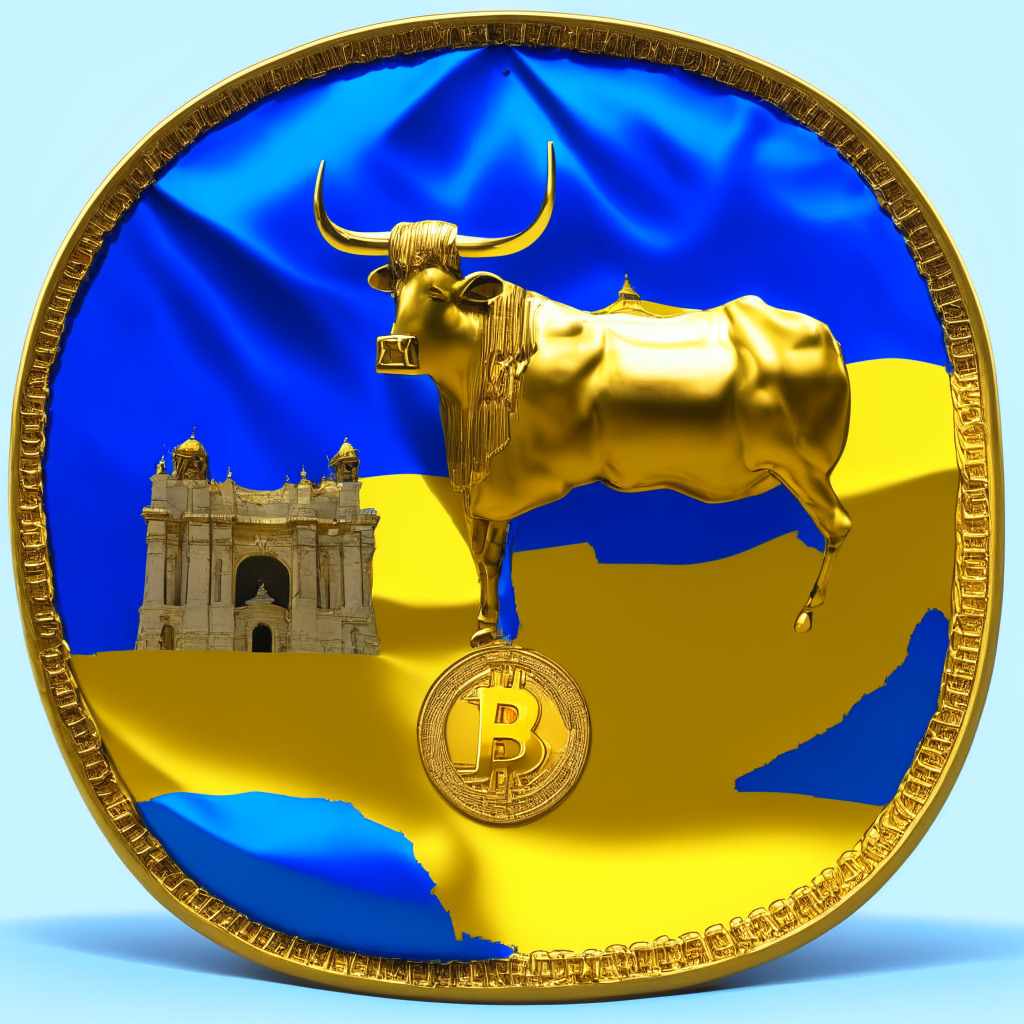The Basel Committee on Banking Supervision might soon impose disclosure requirements for banks’ crypto assets, underlining the risks involved in drastic shifts in finance and technology. Amid discussions about crypto regulations, it’s crucial to balance embracing technological advancements and mitigating their associated risks. A consultation paper on crypto asset exposure disclosure is expected soon.
Search Results for: base
Mandating Full Crypto Holdings Disclosure: Basel Committee’s Bold Move towards Transparency
The Basel Committee on Banking Supervision intends to mandate banks to disclose their cryptocurrency holdings fully, aiming to bolster transparency. They will detail disclosure requirements for bank’s exposure to crypto assets, with the objective to prevent potential risks within the financial ecosystem. Using this approach, the committee hopes to create increased crypto transparency.
Coinbase vs SEC: A Case of Interpretation in Crypto Regulation Compliance
The SEC accuses Coinbase of non-compliance in the registration as a securities exchange, an accusation Coinbase counters by declaring cryptocurrency transactions don’t resemble traditional investment contracts. The lawsuit’s pivot point is the interpretation of the “Howey test” for classifying assets as securities. Coinbase maintains the assets on its platform are not securities and exist outside SEC’s jurisdiction.
Telegram’s Blockchain-based Super-App: An Encroaching Security or Blessing in Disguise?
“Telegram’s Open Network (TON) has received major investment from MEXC exchange, aiming to enhance TON’s role in shaping Telegram’s journey towards becoming a Web3 super-app. However, concerns over security measures are being raised given the potential risks posed by blockchain platforms and crypto transactions.”
Ripple’s Rise in Singapore vs. Coinbase’s Legal Quagmire: Paving the Path for Crypto Regulation
The Monetary Authority of Singapore has awarded Ripple a digital payment tokens license, enhancing its position in the digital asset market. Concurrently, the SEC and Coinbase are engaged in a contentious lawsuit, calling attention to potential hurdles and the urgent need for clear cryptocurrency regulation.
Crypto Regulation Variance: SEC vs Coinbase and Argentina’s Proposed Digital Currency
“The SEC and Coinbase are in court, debating securities registration for crypto assets. Meanwhile, Argentina’s presidential candidates propose differing cryptocurrency solutions to economic issues: introducing a digital currency or supporting Bitcoin and abolishing the central bank.”
Binance in the Crosshairs of Cybercrime: A Case Study in Blockchain-based Law Enforcement
“Binance, a major player in the crypto world is leading the fight against cybercrime, using blockchain technology to ensure user security. Recently, Binance partnered with CCIB and Thailand’s Royal Police, successfully dismantling significant scams and seizing assets worth millions.”
India’s Stride Towards a Global Crypto Database: A Revolution or Big Brother Surveillance?
India is reportedly building a global database for all cryptocurrency exchanges to assist law enforcement agencies in crypto-related crime investigations. This tool could enhance their investigation proficiency in cases like money laundering, a crime primarily increasing worldwide due to cryptocurrency.
Crypto Regulation: Singapore’s Strides Forward with MPI Licenses to GSR Markets and Coinbase
The Monetary Authority of Singapore (MAS) granted GSR Markets, a crypto liquidity provider, a Major Payment Institution license. GSR, like Coinbase, can now provide crypto and fiat-linked services to Singaporean entities and residents, expanding crypto regulation. Despite potential challenges, including transaction irreversibility and crypto’s inherent volatility, Singapore’s balance of fostering innovation while ensuring safety allows over 700 Web3 companies to thrive, indicating a significant crypto future for finance.
Singapore’s Crypto Embrace: Coinbase’s MPI License Triumph and the Double-edged Sword of Security
“Coinbase, the crypto exchange, obtained a Major Payment Institution (MPI) license from Singapore’s Monetary Authority. This approval extends its digital token services in Singapore, augmenting its responsibility towards the expanding crypto and Web3 community. However, potential risks such as hacks, scams, and breaches loom large in the emerging cryptocurrency landscape.”
Coinbase’s Major Step: Securing MPI License under Singapore’s Payment Act
“Crypto exchange Coinbase has secured a full Major Payment Institution license in Singapore, permitting it to expand its crypto payment services. This progress aligns with Coinbase’s global aspirations, while resonating with Singapore’s leading-edge economic approach and regulations. However, the accompanying need for regulatory clarity and risk management is emphasized.”
Expanding Horizons: Ledn’s Ethereum Yield Product & Coinbase’s Regulatory Campaign
Ledn is introducing an Ethereum yield product in response to user demand for simpler staking alternatives. Their new offering is “ring-fenced,” providing a safety layer against bankruptcy. Ledn is also launching a stablecoin Growth Account, though not available in the U.S. or Canada. Meanwhile, Coinbase is seeking clearer crypto regulations, despite skepticism due to political and regulatory concerns.
Coinbase’s Fight for Crypto Regulations: A Brave Campaign or Futile Effort?
“Coinbase CEO, Brian Armstrong, and US crypto entrepreneurs are lobbying Washington for clearer digital currencies rules to simplify regulatory compliance. However, political obstacles and issues like crypto money laundering can hinder the acceptance of these new rules.”
Coinbase Launches Perpetual Futures Trading for Non-US Retail Customers: Risks and Rewards
“Coinbase International announces they will launch perpetual futures trading for non-US retail customers, following additional regulatory approval. This move will allow previously locked-out retail traders access to a market largely controlled by institutions, potentially leveling the playing field.”
Coinbase’s Expansion Emphasizes Need for International Crypto Regulations
Coinbase, a leading US-based crypto exchange, has secured approval from the Bermuda Monetary Authority to offer perpetual futures trading services outside the US. This move aims to tap into the growing retail sector interest in cryptocurrency trading, which constitutes three-quarters of the global crypto trading volumes. With a global expansion strategy covering 24 countries, Coinbase also plans to advocate for standardized cryptocurrency regulations at the G20 forum in Brazil.
Leap into Blockchain Future: Chainlink Incorporates CCIP into Coinbase Layer 2 Network
Blockchain oracle network, Chainlink, has integrated its Cross-Chain Interoperability Protocol (CCIP) into the Coinbase layer 2 network, Base, enabling developers to create web3 products and launch transactions across different networks. This step advances the adoption of innovative crypto products, as Chainlink’s move towards cross-chain lending expands. However, the challenge of potential centralization criticism remains.
Cryptocurrency Conflict: SEC’s Resistance to Celsius Network’s Partnership with Coinbase
“The SEC has expressed concern over Celsius Network’s plan to engage Coinbase for its revival. Sec regulators insist on rigorous scrutiny of the agreement, citing undisclosed terms and potential legal complications. Celsius, recovering from previous SEC charges, remains hopeful for court approval.”
New Bitcoin-based Fungible Token Protocol ‘Runes’ Vs BRC-20: A Double-Edged Sword Debate
Bitcoin Ordinals creator, Casey Rodarmor, proposes a new token protocol, ‘Runes’, as an alternative to the BRC-20 standard. Rodarmor suggests BRC-20 tokens clog the Bitcoin network with “junk” Unspent Transaction Outputs. He believes ‘Runes’ could help promote UTXO set minimization and potentially add value to the Bitcoin network.
Exploring Tether’s Surprise ToS Shift: Unseen Implications for Singapore-Based Users and Crypto Futures
“Tether, the largest stablecoin issuer, has made a significant shift in its terms of service (ToS), restricting access for certain Singapore-based clients, causing anxiety among the crypto-user base. This may be a strategic adherence to regulatory compliance after a major Singaporean crypto scandal or a rebuttal against potential restrictions jeopardizing their operations.”
Coinbase’s AML Registration in Spain: Catalyst for Crypto Influence or Regulatory Dilemma?
Coinbase has obtained an Anti-Money Laundering compliance registration from the Bank of Spain, marking an expansion of its influence in Europe. The cryptocurrency exchange can now offer its products to users in Spain, adhering to local legal frameworks. Also, similar approvals have been received in Italy, Ireland, Netherlands, Singapore, Brazil, and Canada.
Coinbase’s Huge BTC Holdings: Sign of Dominance or Call for Decentralization?
“Cryptocurrency exchange Coinbase reportedly holds 1 million Bitcoin, about 5% of total in existence. However, fears of centralized exchanges halting withdrawals have caused controversy. The company’s ongoing accumulation amid regulatory scrutiny also raises concern. Conversely, its holdings and financial performance highlight its industry dominance.”
Legal Troubles Ripple Through Crypto Space: FTX Controversy and Coinbase’s AML Victory
The article discusses legal disputes in the crypto world, highlighting a lawsuit involving legal team Fenwick & West and cryptocurrency exchange FTX, caught up in allegations of fraudulent activities. On a positive note, it mentions Coinbase’s recent AML compliance registration from the Bank of Spain, indicating global advancements in cryptocurrency regulation.
Coinbase Obtain AML Compliance in Spain: Striking Balance between Global Expansion and Regulatory Challenges
Coinbase has secured an Anti-Money Laundering compliance registration from Spain’s central bank, enabling crypto services in the country. As Coinbase expands globally, it faces possible complications from varying regulatory frameworks and is urged to prioritize asset security as skeptical holders consider withdrawing assets.
Surging Success of Coinbase’s DeFi Network Base: A Flash in the Pan or Future Heavyweight?
Coinbase’s layer-2 network, Base, has surpassed Solana in total value locked (TVL), with a significant 97.21% surge. This increase is majorly driven by decentralized exchange Aerodrome Finance and decentralized social media app Friend.tech. With legislative changes and regulatory scrutiny in play, Base’s future prominence in the crypto world remains uncertain.
Coinbase Holds 5% of all Bitcoin: A Potent Mix of Power and Risk
“Coinbase, a major crypto exchange, now holds 5% of all existing Bitcoin, according to recent data from Arkham, a blockchain intelligence platform. However, this significant holding belongs chiefly to various investors using Coinbase’s platform, emphasizing the continual need for safety measures.”
Surging Ahead: Base Trumps Solana in DeFi TVL, But Is This Sustainable?
“Coinbase’s layer 2 network, Base, has outperformed Solana in the decentralized finance sector, surpassing it in total value locked (TVL). With a significant 97.21% increase in TVL over 30 days, Base emerged as a key player thanks to two Base-native projects, Aerodrome Finance and Friend.tech, despite the inherent volatility of the crypto domain.”
Coinbase’s Unpursued Acquisition of FTX Europe: The Impact on Crypto Derivatives Trading
Coinbase reportedly aimed to acquire bankrupt FTX Europe to expand its overseas derivatives business but ultimately pulled out. The sale of FTX Europe illustrates the high stakes in the crypto sphere, and the growth and risks associated with derivatives trading.
Navigating Regulatory Maelstrom: Coinbase’s Legal Disputes and the Future of Crypto Industry
Despite ongoing legal disputes with the SEC, Coinbase’s Chief Legal Officer, Paul Grewal, views these as potential shapers of the crypto industry’s future. He interprets these challenges as against the entire digital assets and crypto space rather than just Coinbase. He hopes recent judgments could illuminate the SEC’s overreach, and emphasizes the need for regulation clarity. Amid the disputes, Coinbase seeks to change US crypto legislation, highlighting the crucial importance of clear cryptocurrency regulations.
Revolution in Blockchain: A Deep Dive into Coinbase’s Base and the Emerging FriendTech Phenomenon
Coinbase’s layer 2 blockchain, Base, has seen a surge in daily transactions due to FriendTech, a decentralized social network built on Base. Questions about sustainability and authentic user engagement of such platforms have risen. Meanwhile, potential market shock following the sale of tokens from bankrupt crypto exchange FTX may be avoided.
Coinbase’s Layer 2 Blockchain Surpasses Competitors: A Deeper Look into the FriendTech Phenomenon
Coinbase’s layer 2 blockchain, Base, sets record daily transactions, thanks to FriendTech, a decentralized social network platform built on Base. Despite a recent decrease, rekindled Base activity suggests network maturation. This strong start, unaffected by Ethereum’s congestion and fees, could indicate sustainable future growth with “layer-2” networks.
The Impending Exodus: FCA’s New Crypto Rules Stir Unrest Among UK-Based Exchanges
The new Financial Conduct Authority (FCA) rules aiming to make crypto advertising transparent and unbiased, have caused major digital asset exchanges, like Bybit, to contemplate exiting the UK market. The regulations, effective October 8, prohibit certain incentives and bonuses. However, some industrial members see these rules as growth limiting and greatly restrictive.
Coinbase CEO’s Call for DeFi Legal Action: Fight for Fair Regulation or Inhibitor of Crypto Innovation?
Coinbase’s CEO, Brian Armstrong, urges decentralized finance (DeFi) protocols to establish legal precedence amidst the unclear regulatory environment. This move, according to Armstrong, is crucial to prevent the crypto industry from being directed towards foreign jurisdictions. His comments follow enforcement actions by the U.S. CFTC on DeFi companies for purported illicit trading activities.































